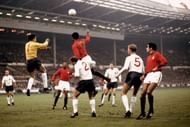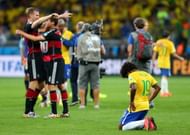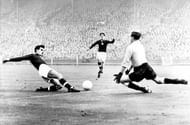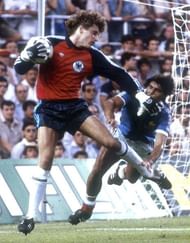The semifinals signal the start of the business end of the tournament. This is the stage where the fairytales come to end. All the teams left have an equal chance of emerging as world champions. There is no room for error.
All this amounts to the prospect of two mouthwatering games, with thrills and spills aplenty as the four teams left to battle it out to secure the first of the two more victories they’d need to emerge as world champions.
This year’s World Cup hasn’t been short on drama, with perennial favourites Brazil, Argentina, Spain and Germany all losing out in the early stages. That leaves us with Belgium, England, France and Croatia in a pan-European battle for supremacy.
As we enter the fourth week of the World Cup, with four teams remaining, this article takes a look at the four most iconic games at the last four stage.
#4 England 2-1 Portugal, 1966

Facing England at Wembley was never a prospect any opponent liked. In the World Cup semifinal in 1966, Portugal found themselves with this thankless task, taking on the host nation who were backed by a crowd of more than 90,000.
Portugal may have been playing in the tournament for the first time, but they certainly weren’t there to make up the numbers. Blitzing defending champions Brazil in the group stage itself was cause enough for fans to sit up and take note of the debutants.
They followed that up with a 5-3 win over North Korea, having been 3-0 down at halftime. The architect in chief for Portugal’s successes was Eusebio, who had already racked up seven goals in the tournament.
The English, however, were in no mood to play generous hosts to their upstart opponents. Sir Alf Ramsey’s men were notorious for their physicality, and they made no exceptions in this match, with a place in the final at stake.
After a few defensive scares, England asserted their dominance and scored the opener through their legendary striker Bobby Charlton – a loose ball fell to his feet and he let fly from around twenty yards out, beyond the despairing dive of the Portugal custodian.
Eusebio had been hogging the headlines throughout the World Cup, but the English defence kept him remarkably quiet. Marshalled brilliantly by Jack Charlton and captain Bobby Moore, England didn’t offer the ‘Black Panther’ a yard of space.
Portugal, however, wasn’t a one-man team, and the likes of Simoes and Jose Torres still offered plenty of threat going forward, and they had their share of chances.
The game was hanging in the balance with England defending stoutly to protect their slender one-goal lead as Portugal came at them with increasing urgency.
Up stepped Charlton yet again – collecting a pass, he struck it sweetly from the edge of the penalty box to double England’s lead, prompting pandemonium inside Wembley.
Portugal still had fight left in them and within minutes, Eusebio pulled one back from the penalty spot, leading to a nervous finale as a tiring English backline held firm as the clocked ticked towards ninety minutes.
However, Portugal couldn’t find an equalizer, and their World Cup fairytale was over. England were through to the final, where they would eventually beat West Germany to win their only World Cup so far.
Charlton may have been the hero for the English with his brace, but this game is remembered because of the exploits of his brother Jack, whose heroics in defence kept one of the greatest attackers of his generation subdued in an otherwise absorbing contest.
#3 Brazil 1-7 Germany, 2014

Belo Horizonte is now part of Brazilian folklore, and for all the wrong reasons. The venue for one of the 2014 World Cup semifinals was buzzing before the host nation took on Germany in what promised to be an epic clash.
The task was uphill for Brazil, especially with the silky Neymar out injured and defensive stalwart Thiago Silva suspended.
But the locals still had plenty of belief and were certain that their beloved national team would swat away the Germans, who hadn’t really hit top gear yet. Germany went into overdrive in this game.
It all started with one of Thomas Muller’s trademark tap-ins. This eleventh-minute strike initially seemed like it had woken up Brazil – Marcelo went on one of his rampaging runs and they enjoyed greater possession.
But all that goal did was open the floodgates for more. Within minutes, Miroslav Klose had doubled the German lead – he scored his record-breaking sixteenth World Cup goal.
That was followed up by two copybook goals from Toni Kroos and Sami Khedira – shambolic defending left open acres of space and Germany’s midfielders ran riot in a devastating five-minute spell.
Germany had a 5-0 lead with only half an hour gone. They had decimated a team and a nation.
Brazil was spineless at the back and toothless going forward, and it seemed as if the whole team was getting sucked into the Neymar-shaped hole they were playing with.
Germany added two more goals in the second half through Andre Schurrle to establish an improbable seven-goal lead in what was billed as a close match. Oscar pulled a goal back in stoppage time which was arguably the meekest consolation Brazil have ever scored.
#2 Hungary 4-2 Uruguay (after extra time), 1954

The 1954 edition of the World Cup threw up a spate of iconic games, and this one tops the list. The people of Lausanne witnessed a battle of gargantuan proportions, as the two best teams in the world faced off for a place in the final.
Uruguay came into this game as defending champions and with the astonishing record of having never lost a World Cup match.
Not to be outdone, Hungary arrived with their own jaw-dropping statistics – they had not lost a football match in four years, and were making waves with their ultra-attacking style of play - Hungary came into the semifinal having won 9-0 against South Korea and having pumped eight past West Germany, while Uruguay had hammered Scotland 7-0.
Hungary was happy to pass the ball around, even in the pouring rain. Their overwhelming possession soon culminated in the opening goal, through Zoltan Czibor’s drive.
Uruguay was still relying on individual bursts of skill and pace, which allowed the Europeans to continue dominating throughout the first half. Hungary picked up where they left off after the change of ends and added to their lead through Nandor Hidegkuti.
With their backs to the wall, Uruguay had no choice but to go hell for leather in attempting to salvage anything from this game.
Midfielder Juan Hohberg’s influence grew gradually as the South Americans found themselves in the Hungarian half more often, and it paid dividends, as Hohberg himself reduced the deficit to make it 2-1, with fifteen minutes left.
Sensing blood, Uruguay now started bombarding the Hungarian goal in search of an equalizer.
After several near misses, Hohberg once again scored in the 86th minute to restore parity between the sides. At full time, the scores were locked at 2-2: this enthralling spectacle was to continue for half an hour more.
The continuous defending Uruguay had to do in order to keep Hungary at bay was resulting in tiredness, and the fitter Europeans took full advantage: star striker Sandor Kocsis scored twice in the space of seven minutes to take Hungary to the final after a classic in Lausanne.
Hungary eventually lost to West Germany in the final. From thereon, the collapse of Hungarian football started, ending with the Hungarian Revolution a couple of years later.
#1 France vs West Germany, 1982

The rivalry between the Germans and the French are well documented, both on the field and off it.
As the two European heavyweights clashed in their semifinal, this rivalry assumed unprecedented proportions at the Estadio Ramon Sanchez Pizjuan in Sevilla in an epic contest, and arguably the best World Cup match ever played.
Germany was missing European Footballer of the Year Karl-Heinze Rummenigge, who was nursing a hamstring injury. The Germans, however, made light weather of his absence and opened the scoring through Pierre Littbarski.
This opening goal spurred on the French, with the effervescent Michel Platini gradually starting to pull the strings in attack.
Their newfound vigour paid dividends within ten minutes, as Bernd Forster wrestled with Dominique Rocheteau inside the German penalty box – the referee had no hesitation pointing to the spot. Platini equalized for France.
The most iconic moment of the game came, unfortunately, not in the form of a goal or an outrageous skill, but a moment of pure villainy and utter madness.
The brilliant Platini had played a delightful through ball for French substitute Patrick Battiston, who raced through on goal, with only German goalkeeper Harald Schumacher to beat.
Schumacher charged forward in an attempt to tighten the angle, but he didn’t seem to want to stop and ran right through Battiston, clattering him in the process.
The ball rolled out for a goal-kick as Battiston lay unconscious for seven whole minutes before being stretchered off for further treatment.
Medics later revealed that the Frenchman for a few moments had no pulse, and his visage assumed an increasingly pale appearance. He lost two teeth, along with broken vertebrae and three cracked ribs in what still is one of football’s most horrific injuries.
The referee, however, was unmoved – Schumacher escaped all punishment and only a goal-kick in favour of the Germans was awarded.
Angered by the blatant injustice, France took the game by the scruff of the neck but alas they couldn’t find a goal.
Both teams, in fact, squandered plenty of chances, most notably when Manuel Amoros hit the woodwork in stoppage time. With both sides, not their usual, clinical selves, it finished 1-1 at the end of regulation time.
The already arresting game sprung to life within minutes of the additional period kicking off, as France finally found their shooting boots – Marius Tresor’s volley from eleven yards out giving France the lead for the first time in the match. Not being able to watch on from the sidelines, the injured Rummenigge came on for Germany in a desperate bid to turn the game in their favour.
France, however, was in no mood to relent and Alain Giresse made it 3-1 within the next five minutes to send Les Bleus to within inches of the final.
Giving in was not an option for Germany, who yanked the game back to life with a delightful flicked goal from the substitute Rummenigge, who was making quite an impact in the handful of minutes he had played.
With just one goal separating the two teams, Germany pushed forward and came at the French relentlessly, resulting in Klaus Fischer scoring an acrobatic bicycle kick to improbably level the scores at 3-3.
With not one team sparing an inch in this incredibly tight contest, it came down to a penalty shootout for the first time ever in a World Cup.
The French raced into a 3-2 lead when Didier Six walked up to try and give them an almost unassailable lead.
However, his tame shot was saved by nobody’s favourite Schumacher, and the shootout continued. Schumacher once again managed to keep out a French penalty two rounds later, this time from Maxime Bossis.
The stage was set for Horst Hrubesch to seal it for the Germans, and he did so with aplomb, sending the keeper the wrong way, to send Germany into the final.
The Germans eventually lost the final to Italy, which was met with wild celebrations in France as well.
The entire Schumacher-Battiston incident remained a blot on what Platini described as “the most beautiful” game he had ever played – it certainly did add to the drama and strengthened the already intense rivalry that needs no introduction.
Do you agree with our list? Sound off your opinions in the comments section below!
